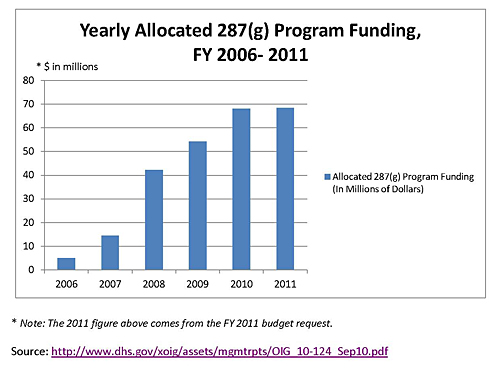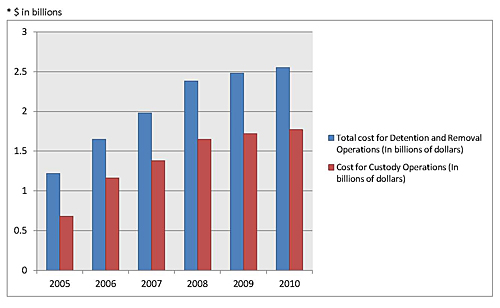ACLU to Super Committee: Cut Out-Of-Control Spending on Ineffective Immigration Programs
As we all know, in order to save the U.S. from fiscal ruin, Congress is desperate to cut federal spending.
That’s why the Joint Select Committee on Deficit Reduction, a bipartisan 12-member group also known as the “Super Committee,” has been tasked with proposing how to cut $1.2 trillion over the next decade. There will certainly be a lot of difficult choices to make.
But here is an easy place for the Super Committee to start: cut funding for out-of-control spending on three immigration programs – 287(g), Secure Communities (“S-COMM”) and detention.
The ACLU, joining with dozens of organizations and groups across the country, has made these recommendations to the Super Committee in two separate letters sent today and yesterday.
One letter argues that a Department of Homeland Security (“DHS”) program known as 287(g), which deputizes state and local police to enforce federal immigration laws, should not continue to receive funding. A report from the Government Accountability Office concluded that the program lacked key internal controls and performance objectives. Another report by the DHS Office of the Inspector (OIG) set forth 33 recommendations for Immigration and Customs Enforcement (ICE) to address in order to ensure the program’s integrity, economy and efficiency.
Still, despite the fact that the 287(g) program is fraught with systematic problems, which ICE has failed to fix, the program has received increased funding from $5 million in 2006 to $68 million in 2010. A total of $251.6 million has been spent over the past six years on a program that is clearly flawed.

This graph shows the amounts appropriated yearly in the budget for the 287(g) program, from FY 2006 through FY 2011.
The same holds true for the government’s unnecessary spending on the costly and untested Secure Communities program. Under S-Comm, any time an individual is arrested and booked into a participating local jail for any reason, his or her fingerprints are electronically run through DHS’s immigration database, allowing DHS to identify noncitizens in local custody and to initiate deportation proceedings against them.
Despite the fact that Congress made it clear that S-Comm should be used to identify and deport people convicted of serious crimes, DHS statistics show that as of July 21, 2011, 29 percent of those deported under S-Comm were non-criminals, and an additional 30 percent had been convicted of misdemeanor offenses only. That means nearly 60 percent of individuals deported under S-Comm did not meet the standards specified by Congress when it provided $750 million for the program over the past three years.
S-Comm has virtually no government oversight or public accountability, and also raises a host of civil rights problems by encouraging racial profiling and undermining the constitutional guarantees of due process and equal protection. It certainly should be on the chopping block.
The ACLU’s other letter to the Super Committee, sent yesterday, makes a strong case for cuts to DHS’s exorbitant spending to lock up immigrants including many who pose no flight risk, are not a public safety concern and have no criminal record.
In fact, the majority of immigration detainees locked up by DHS from 2005 through 2009 had no criminal convictions whatsoever. According to DHS’s own analysis, “[t]he majority of the population is characterized as low custody, or having a low propensity for violence.”
Locking up these individuals is clearly a waste of our government’s time and resources. Yet over the last decade, the annual immigration detainee population has grown 80 percent – from 202,000 to 363,000. Today, approximately 33,400 individuals are locked up each day in immigration jails, compared with 18,000 in 2003 — representing an 86 percent increase.
This explosion in immigration detention has been accompanied by astonishing increases in immigration detention spending. For FY 2012, the President requested more than $2 billion (a record-high) for immigration detention beds. Between FY 2002 and FY 2010, DHS Immigration and Customs Enforcement (“ICE”) overall budget more than doubled, increasing to $5.74 billion in FY 2010 from the $2.4 billion spent on comparable functions in FY 2002.

This chart depicts ICE’s yearly spending on Detention and Removal Operations, or costs associated with the process of removing people from the country, as well as Custody Operations, a subset of that number which includes costs specifically associated with detaining those who are removed.
This dramatic increase in government spending also comes at a time when there has been sharp decline in illegal immigration rates and a decrease in the undocumented population.
As the ACLU and allies point out in the letter, there are many alternatives to detention that cost much less per day than immigration detention. While the cost of detention can exceed $122 per day per detainee, most alternatives cost from 30 cents to $14 per day.
It’s time for Congress to stop wasting funds on ineffective immigration programs that are expensive and excessive. Hopefully, come Nov. 23, when the Super Committee issues its proposal, it will take all this under consideration. Not only will cutting these programs save precious taxpayer money, it will also prevent many potential civil rights violations from occurring.
Learn more about prison spending: Sign up for breaking news alerts, follow us on Twitter, and like us on Facebook.




